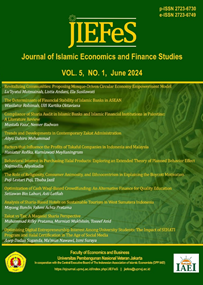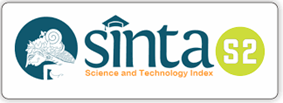The Urgency of Financial Literacy in Hajj Funds Management for Indonesian Muslims
DOI:
https://doi.org/10.47700/jiefes.v5i1.7302Keywords:
Financial Literacy, Hajj funds, Education, Communication, Public TrustAbstract
It was not widely known by the public that the cost of performing the hajj exceeded the predetermined Cost of the Hajj Travel (Biaya Perjalanan Ibadah Haji/BIPIH) set by the government. Although the government plays a role in subsidizing the cost of pilgrimage organizing (Biaya Penyelenggaraan Ibadah Haji/BPIH), the actual calculation is never shared with the public, leaving many in the dark. Indonesian Muslims must be educated about the importance of financial literacy. This article aims to provide a comprehensive understanding of Hajj, shedding light on the Muslim perspective in Indonesia regarding Hajj and its management. This comprehension will empower the community to approach matters with reason and facilitate their involvement in monitoring the management of Hajj funds. The concept of Hajj's financial literacy aims to address the communication gap in managing Hajj funds. The proposed solution is continuous education and stimulation actions that functioned in fostering a sense of novelty and raising public trust in the community. The Ministry of Religion, the Ministry of Education, and community-accessible institutions such as the police (e.g., Babinsa) and Indonesian National Army (Tentara Nasional Indonesia/TNI), as well as religious leaders, mass organizations, and other members of society, should work together to shift society's mindset.
References
Allianz. (2017). When will the penny drop? Money, financial literacy and risk in the digital age. Global Financial Literacy Excellence Center. http://gflec.org/initiatives/money-finlit-risk/
Aziz, R. M. (2018). Hahslm Theory as Guidance of Straight Path in Management of Hajj and Finance. KnE Social Sciences, 3(8), 105. https://doi.org/10.18502/kss.v3i8.2503
Bidang PHU Kanwil Kemenag Kalsel. (2023). Kasi PHU Ajak Masyarakat Pahami Perbedaan BPIH, Bipih dan Nilai Manfaat. Bidang PHU Kanwil Kemenag Kalsel. https://hajikalsel.kemenag.go.id/berita/889/Kasi-PHU-Ajak-Masyarakat-Pahami-Perbedaan-BPIH-Bipih-dan-Nilai-Manfaat
Bouckaert, G., Galli, D., Kuhlmann, S., Reiter, R., & Van Hecke, S. (2020). European Coronationalism? A Hot Spot Governing a Pandemic Crisis. Public Administration Review, 80(5), 765–773. https://doi.org/10.1111/puar.13242
Bovens, M. (2007). Analysing and Assessing Accountability: A Conceptual Framework. Rethinking Revolutions, 13(4), 273–304. https://doi.org/10.1093/acprof:oso/9780199465330.003.0009
Bovens, M., Goodin, R. E., Schillemans, T., Bovens, M., Schillemans, T., & Goodin, R. E. (2014). Public Accountability. In The Oxford Handbook of Public Accountability (Issue September 2018). https://doi.org/10.1093/oxfordhb/9780199641253.013.0012
Bovens, M., Schillemans, T., & Hart, P. T. (2008). Does Public Accountability Work? An Assessment Tool. Public Administration, 86(1), 225–242. https://doi.org/10.1111/j.1467-9299.2008.00716.x
Burlea-schiopoiu, A., & Popa, I. (2013). Legitimacy Theory. In S. O. Idowu, N. Capaldi, L. Zu, & A. das Gupta (Eds.), Encyclopedia of Corporate Social Responsibility. Springer- Verlag. https://doi.org/10.1007/978-3-642-28036-8
Clark, R. L., Lusardi, A., & Mitchell, O. S. (2015). Employee Financial Literacy and Retirement Plan Behavior: A Case Study. SSRN Electronic Journal. https://doi.org/10.2139/ssrn.2650476
Cutlip, S. M., Center, A. H., & Broom, G. M. (2000). Effective Public Relations (8th ed.). Prentice Hall.
Dowling, J., & Pfeffer, J. (1975). Pacific Sociological Association Organizational Legitimacy: Social Values and Organizational Behavior. Source: The Pacific Sociological Review, 18(1), 122–136.
Dubnick, M. J. (2007). Situating Accountability: Seeking Salvation for the Core Concept of Modern Governance. Unpublished Paper. https://mjdubnick.dubnick.net/papersrw/2007/situate2007.html
Elliott, R., & Timulak, L. (2021). Essentials of Descriptive-Interpretive Qualitative Research: A Generic Approach. American Psychological Association. https://doi.org/10.1037/0000224-000
Heinberg, A., Hung, A., Kapteyn, A., Lusardi, A., Samek, A. S., & Yoong, J. (2014). Five steps to planning success: Experimental evidence from US households. Oxford Review of Economic Policy, 30(4), 697–724. https://doi.org/10.1093/oxrep/gru036
Herman, A. (2021). Indonesian Government’s Public Communication Management During a Pandemic. Problems and Perspectives in Management, 19(1), 244–256. https://doi.org/10.21511/ppm.19(1).2021.21
Hütten, M. (2018). Critical financial literacy : an agenda Daniel Maman Zeev Rosenhek Matthias Thiemann. International Journal of Pluralism and Economics Education, 9(3), 274–291. https://doi.org/10.1504/ijpee.2018.093405
Indriani, S., Zamri, A., & Annuar, H. A. (2023). An organizational legitimacy in managing the hajj funds legitimasi organisasi dalam mengelola dana haji. COSTING:Journal of Economic, Business and Accounting, 7(1). https://journal.ipm2kpe.or.id/index.php/COSTING/article/view/8483/4898
Klapper, L., Lusardi, A., & Van Oudheusden, P. (2015). Financial Literacy around the World. Standard & Poor’s Ratings Services Global Financial Literacy Survey.
Kuruppu, S. C., Milne, M. J., & Tilt, C. A. (2019). Gaining, maintaining and repairing organisational legitimacy: When to report and when not to report. Accounting, Auditing and Accountability Journal, 32(7), 2062–2087. https://doi.org/10.1108/AAAJ-03-2013-1282
Lahsasna, A. (2016). Framework of Islamic Financial Education and Literacy. Journal of Wealth Management and Financial Planning, 3, 3–14.
Lusardi, A. (2019). Financial literacy and the need for financial education: evidence and implications. Swiss Journal of Economics and Statistics, 155(1), 1–8. https://doi.org/10.1186/s41937-019-0027-5
Lusardi, A., Mitchell, O. S., & Oggero, N. (2018). The Changing Face of Debt and Financial Fragility at Older Ages. In American Economic Association (Vol. 108). AEA PAPERS AND PROCEEDINGS. https://doi.org/10.1257/pandp.20181117
MacMillan, J. ., & Schumacher, S. (2001). Research in Education. A Conceptual Introduction. Longman.
Meijer, A., & Schillemans, T. (2009). Fictional Citizens and Real Effects: Accountability to Citizens in Competitive and Monopolistic Markets. Public Administration and Management, 14(2), 254–291.
Nasution, N., Unti, L., Gugus, I., & Zaki, B. (2019). Ta’awun Pattern Of Governance Of Hajj Funds In The Ministry Of Religion Of The Republic Of Indonesia. The International Journal of Accounting and Business Society, 27(1), 47–54. https://doi.org/http://dx.doi.org/10.21776/ub.ijabs.2019.27.1.3
Newsom, J. T., Rook, K. S., Nishishiba, M., Sorkin, D. H., & Mahan, T. L. (2005). Understanding the relative importance of positive and negative social exchanges: Examining specific domains and appraisals. Journals of Gerontology - Series B Psychological Sciences and Social Sciences, 60(6). https://doi.org/10.1093/geronb/60.6.P304
O’Neil, D. (2006). What Is Culture. Human Culture: An Introduction to the Characteristics of Culture and the Methods used by Anthropologists to Study It. http://anthro.palomar.edu/culture/culture_1.htm
OECD. (2019). Indonesia Education at a Glance. In OECD: Country Note. https://doi.org/https://doi.org/10.1787/f8d7880d-en
OJK. (2017). Menjaga Kestabilan, Meningkatkan Kesejahteraan. In Laporan Tahunan. https://www.ojk.go.id/id/data-dan-statistik/laporan-tahunan/Documents/Laporan Tahunan OJK 2017.pdf
Page, S. (2006). The web of managerial accountability: The impact of reinventing government. In Administration and Society (Vol. 38, Issue 2). https://doi.org/10.1177/0095399705285990
Rahman, S. F. A. (2020). Financial Education Programmes Organised By Mosques As a Platform To Increase Financial Literacy in Malaysia. TAFHIM : IKIM Journal of Islam and the Contemporary World, 13(1), 57–83. https://doi.org/10.56389/tafhim.vol13no1.3
Schmidt, V., & Wood, M. (2019). Conceptualizing throughput legitimacy: Procedural mechanisms of accountability, transparency, inclusiveness and openness in EU governance. Public Administration, 97(4), 727–740. https://doi.org/10.1111/padm.12615
Schweiker, W. (1993). Accounting for ourselves: Accounting practice and the discourse of ethics. Accounting, Organizations and Society, 18(2–3), 231–252. https://doi.org/10.1016/0361-3682(93)90035-5
Scott, K. (2003). Funding Matters: The Impact of Canada ’ s New Funding Regime on Nonprofit and Voluntary Organizations. January 2003, 175. http://www.ccsd.ca/pubs/2003/fm/index.htm
Scott, W. (2003). Financial Accounting Theory (3rd ed.). Prentice Hall.
Scott, W. R., Ruef, M., Mendel, P. J., & Caronna, C. A. (2000). Institutional Change and Healthcare Organizations. University Chicago Press.
Steccolini, I. (2004). Is the Annual Report an Accountability Medium? An Empirical Investigation Into Italian Local Goverments. Financial Accountability & Management, 20(3), 0267–4424.
Subakti, H. A. (2021). Alasan di Balik Keputusan Menag Batalkan Haji 2021. CNBC Indonesia. https://www.cnbcindonesia.com/news/20210606124604-4-250876/alasan-di-balik-keputusan-menag-batalkan-haji-2021
Suchman, M. C. (1995). Managing Legitimacy: Strategic and Approaches. Academy of Management Review, 20(3), 571–610. https://doi.org/10.2307/258788
Tang, Y. (2017). A Summary of Studies on Organizational Legitimacy. Open Journal of Business and Management, 05(03), 487–500. https://doi.org/10.4236/ojbm.2017.53042
Unerman, J., & Bennett, M. (2004). Increased stakeholder dialogue and the internet: Towards greater corporate accountability or reinforcing capitalist hegemony? Accounting, Organizations and Society, 29(7), 685–707. https://doi.org/10.1016/j.aos.2003.10.009
Vosselman, E. (2013). Accounting, Accountability, and Ethics in Public Sector Organizations: Toward a Duality Between Instrumental Accountability and Relational Response-Ability. Administration and Society, 20(10), 1–26. https://doi.org/10.1177/0095399713514844
Worthington, A. C., & Marzuki, A. (2021). Financial Literacy, Financial Education, and Islamic Finance. In The Routledge Handbook of Financial Literacy (1st Editio, p. 16). https://doi.org/10.4324/9781003025221-35
Yasmin, S., Haniffa, R., & Hudaib, M. (2014). Communicated Accountability by Faith-Based Charity Organisations. Journal of Business Ethics, 122(1), 103–123. https://www.jstor.org/stable/42921420
Downloads
Published
Issue
Section
License
Copyright (c) 2024 Susi Indriani Sarka, Ahmad Zamri Osman , Hairul Azlan Annuar

This work is licensed under a Creative Commons Attribution 4.0 International License.
Authors who publish with this journal agree to the following terms:
- Authors retain copyright and grant the journal right of first publication with the work simultaneously licensed under a Creative Commons Attribution 4.0 International License that allows others to share the work with an acknowledgment of the work's authorship and initial publication in this journal.
- Authors can enter into separate, additional contractual arrangements for the non-exclusive distribution of the journal's published version of the work (e.g., post it to an institutional repository or publish it in a book), with an acknowledgment of its initial publication in this journal.
- Authors are permitted and encouraged to post their work online (e.g., in institutional repositories or on their website) before and during the submission process, as it can lead to productive exchanges, as well as earlier and greater citation of published work.

This work is licensed under a Creative Commons Attribution 4.0 International License.











